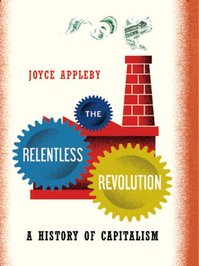Source of book image:
http://ecx.images-amazon.com/images/I/519PfT2oUtL.jpg
(p. 15) What is the nature of capitalism? For Joseph Schumpeter, the Austrian-born economist whose writings have acquired a special relevance in the past year or two, this most modern of economic systems “incessantly revolutionizes the economic structure from within, incessantly destroying the old one, incessantly creating a new one.” Capitalism, Schumpeter proclaimed, cannot stand still; it is a system driven by waves of entrepreneurial innovation, or what he memorably described as a “perennial gale of creative destruction.”
Schumpeter died in 1950, but his ghost looms large over Joyce Appleby’s splendid new account of the “relentless revolution” unleashed by capitalism from the 16th century onward. Appleby, a distinguished historian who has dedicated her career to studying the origins of capitalism in the Anglo-American world, here broadens her scope to take in the global history of capitalism in all its creative — and destructive — glory.
She begins “The Relentless Revolution” by noting that the rise of the economic system we call capitalism was in many ways improbable. It was, she rightly observes, “a startling departure from the norms that had prevailed for 4,000 years,” signaling the arrival of a new mentality, one that permitted private investors to pursue profits at the expense of older values and customs.
In viewing capitalism as an extension of a culture unique to a particular time and place, Appleby is understandably contemptuous of those who posit, in the spirit of Adam Smith, that capitalism was a natural outgrowth of human nature. She is equally scornful of those who believe that its emergence was in any way inevitable or inexorable.
. . .
. . . , she captures how a new generation of now forgotten economic writers active long before Adam Smith built a case “that the elements in any economy were negotiable and fluid, the exact opposite of the stasis so long desired.” This was a revolution of the mind, not machines, and it ushered in profound changes in how people viewed everything from usury to joint stock companies. As she bluntly concludes, “there can be no capitalism . . . without a culture of capitalism.”
. . .
The individual entrepreneur is at the center of her analysis, and her book offers thumbnail sketches of British innovators from James Watt to Josiah Wedgwood. She continues on to the United States and Germany, giving readers a whirlwind tour of the lives and achievements of a host of men whom she calls “industrial leviathans” — Vanderbilt, Rockefeller and Carnegie in the United States; Thyssen, Siemens and Zeiss in Germany. All created new industries while destroying old ones.
For the full review, see:
STEPHEN MIHM. “Capitalist Chameleon.” The New York Times Book Review (Sun., January 24, 2010): 15.
(Note: ellipses added except for the one in the “there can be no capitalism . . . without a culture of capitalism” quote.)
(Note: the online version of the review is dated January 22, 2010.)
Book under review:
Appleby, Joyce. The Relentless Revolution: A History of Capitalism. New York: W. W. Norton & Company, 2010.

